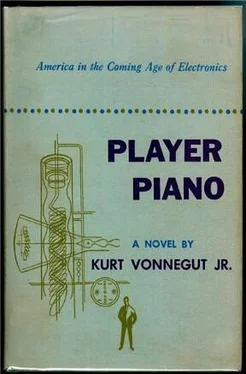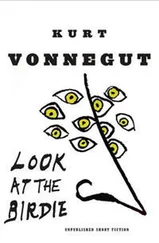"They'd better scurry before your fury,
And in a hurry, without a clue;
Because the -"
Baer's piercing voice cut through Kroner's bass with the White Team's song, to the tune of "Tramp, Tramp, Tramp":
"White, White, White's the one to watch for.
Blue, Green, Red will come to grief.
Before the fury of the White
They'll get knocked clear out of -"
The scuffling grew louder, and the songs degenerated into panting laughter. There was a clatter in Paul's receiver, a cry, a click, and then the dial tone.
Paul restored the receiver to its cradle with a limp hand. There was no quitting before the Meadows, he told himself glumly - no re-educating Anita and quitting in the few days remaining. The Meadows would have to be endured, and, worse luck, he would have to endure it as captain of the Blue Team.
His glance passed over the hairy tan chest, frank gray eyes, and keg-sized biceps of the man on the book jacket, and his thoughts slid easily, gratefully, into the fantasy of the new, good life ahead of him. Somewhere, outside of society, there was a place for a man - a man and wife - to live heartily and blamelessly, naturally, by hands and wits.
Paul studied his long, soft hands. Their only callus was on the large finger of his right hand. There, stained a dirty orange by cigarette tars, a tough hump had grown over the years, protecting his finger against the attrition of pen and pencil shafts. Skills - that was what the hands of the heroes in the novels had, skills. To date, Paul's hands had learned to do little save grip a pen, pencil, toothbrush, hair brush, razor, knife, fork, spoon, cup, glass, faucet, doorknob, switch, handkerchief, towel, zipper, button, snap, bar of soap, book, comb, wife, or steering wheel.
He recalled his college days, and was sure he'd learned some sort of manual skill there. He'd learned to make mechanical drawings. That was when the lump on his finger had begun to grow. What else? He'd learned to bounce a ball off several walls with skill, and to the consternation of most of his squash opponents. He'd been good enough to make the quarter-finals of the Regional Collegiate Squash Tournament two years in a row. He used to be able to do that with his hands.
What else?
Again uneasiness crept up on him - the fear that there was far too little of him to get along anywhere outside the system, to get along at all contentedly. He might go into some small business, such as the one he claimed to be in when he didn't want to be recognized - wholesale groceries. But he would still be caught in the mesh of the economy and its concomitant hierarchy. The machines wouldn't let him into that business, anyway, and even if they would, there'd be no less nonsense and posturing. Moreover, despite the fact that Paul was saying to hell with the whole system, he was aware that the relatively unskilled and dull business of buying and selling was beneath him. So to hell with it. The only thing worse would be complete idleness, which Paul could afford, but which, he was sure, was as amoral as what he was quitting.
Farming - now there was a magic word. Like so many words with little magic from the past still clinging to them, the word "farming" was a reminder of what rugged stock the present generation had come from, of how tough a thing a human being could be if he had to. The word had little meaning in the present. There were no longer farmers, but only agricultural engineers. In the rich Iroquois Valley in Ilium County, thousands of settlers had once made their living from the soil. Now Doctor Ormand van Curler managed the farming of the whole county with a hundred men and several million dollars' worth of machinery.
Farming. Paul's pulse quickened, and he daydreamed of living a century before - living in one of the many farmhouses now crumbling into their foundations over the valley. He chose one farmhouse in particular for his fantasy, one close to the edge of town that he'd often admired. He suddenly realized that the farm, the little patch of the past, wasn't a part of van Curler's farm system. He was almost sure it wasn't.
"Katharine," he called excitedly, "get me the Ilium Real Estate Manager on the phone."
"Ilium Real Estate Office. Doctor Pond speaking." Pond's speech was effeminate, lisping.
"Doctor Pond, this is Doctor Proteus at the Works."
"Well! What can I do for you, Doctor Proteus?"
"You know that farmhouse out on King Street, just outside the city limits?"
"Mmmm. Just a moment." Paul heard a machine shuffling through cards, and then a bell announced that the card had been found. "Yes, the Gottwald place. I have the card right here."
"What's being done with it?"
"A good question! What can be done with it? I wish I knew. It was a hobby with Gottwald, you know, keeping it just like an old-fashioned farm. When he died, the heirs wanted to get van Curler to take it over, but he said it wasn't worth bothering with. Two hundred acres is all, and he'd have to cut down the windbreaks to connect it with other fields so he could farm it efficiently. Then the heirs found out that they couldn't have sold it to the Farm System anyway. It's in the deed that the place has to be kept old-fashioned." He laughed bitterly. "So all old Gottwald left his heirs was a nice headache, a white elephant."
"How much?"
"Are you serious? The thing's a museum exhibit, Doctor. I mean, almost nothing mechanical on the place. Even if you could beat the restrictions in the deed, it'd cost you thousands to get it in shape."
"How much?" The farm was looking better and better.
"Eighteen thousand, it says on the card." Before Paul could close the deal that instant, Pond added, "but you can get it for fifteen, I'm sure. How would twelve suit you?"
"Would five hundred hold it until I can look it over?"
"It's been holding itself for almost fourteen years. Go on out and have a look, if you really feel you have to. After you've thrown up, there are some really nice things I'd like to show you." The machine riffled through its cards again. "For instance, there's a nice Georgian house on Griffin Boulevard. Electronic door openers, thermostatically controlled windows, radar range, electrostatic dust precipitators, ultrasonic clothes washer built in, forty-inch television screens in the master bedroom, guest room, living room, kitchen, and rumpus rooms, and twenty-inch screens in the maids' rooms and the kiddies' rooms, and -"
"Where can I get the key to the farm?"
"Oh, that thing. Well, to give you an idea of what you're getting into, there is no lock. There's a latchstring."
"Latchstring?"
"Yes, latchstring. I had to go out myself to find out what the darn thing is. There's a latch on the inside of the door, with a string tied to it. When you want to let somebody just walk in, you stick the little string through a hole in the door, so the string dangles outside. If you don't want people walking in, you pull the string in through the hole. Ghastly?"
"I'll survive somehow. Is the latchstring out?"
"There's a caretaker there, detailed from the Reeks and Wrecks. I'll call him and tell him to put it out. Confidentially, I'm sure they'll take eight."
THE latchstring at the Gottwald house was out for Doctor Paul Proteus.
He tugged at it, listened with satisfaction as the latch disengaged itself inside, and walked in. The living room was dimly lit through tiny-paned, dusty windows, and what light did get in died without reflection on dull, dark antique surfaces. The floor rose and fell like a springboard beneath Paul's feet.
"The house breathes with you, like good underwear," said a lisping voice from the shadows. Paul looked in the direction from which it had come. The man sucked on his cigarette, lighting his moon face with a pink glow. "Doctor Proteus?"
Читать дальше








![Курт Воннегут - Вампитеры, фома и гранфаллоны [litres]](/books/397997/kurt-vonnegut-vampitery-foma-i-granfallony-litre-thumb.webp)